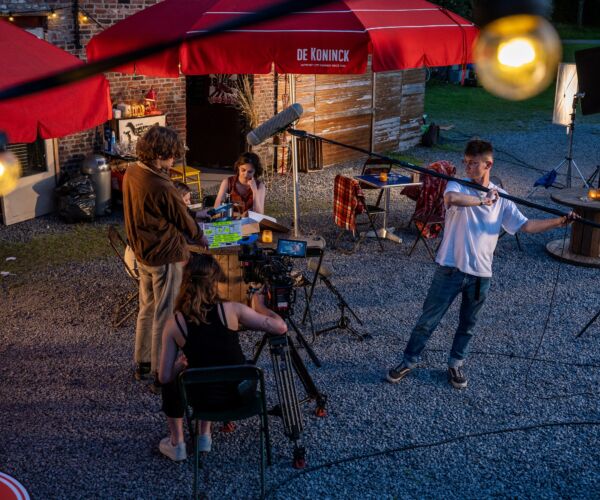Sound Design
As a sound designer, you create an appropriate and original soundtrack for a film, as well as for other art forms such as theater, radio plays, dance performances, installations and VR.
You will be responsible for sound recording, sound editing and mixing. Here the emphasis is on being creative with sound and technology. In a film, you shape everything that can be heard, both inside and outside the picture, and support the story with an emotional and metaphorical layer. Your own artistic vision and personal style are always very important here. You will work closely with a director to integrate sound and image into a compelling overall experience. Furthermore, as a student, you will work creatively with a director in telling your story. The use of technical equipment and the application of an appropriate method always contribute to achieving the best result for a given assignment.
All classes are in Dutch.

Bachelor
In the first year of the bachelor’s programme, as a sound design student, you will discover the basic audiovisual principles alongside students from the writing, directing, production, cinematography, and editing tracks. This lays the foundation for future collaborations, with each discipline contributing its specialised expertise. You will also take specific sound design courses, such as set recording, post-production, and audio technology, and you will be immersed in the history of art and film. By the end of the first year, you will present a personal sound project.
In the second year, general courses will challenge you to sharpen your critical reflection on the post-production process, the audiovisual medium, and society. As a sound designer, your focus will be on the three main aspects of a soundtrack: sound recording, sound editing, and sound mixing, for both documentary and fiction films. You will propose ideas regarding sound tone, drama, and the narrative aspect of each project, in consultation with the director. Developing your own vision becomes increasingly important.
In the third year, you will gradually develop a more professional attitude during the practical workshops. The variety of different projects will allow you to enhance and refine your technical skills. You will deepen your expertise through lessons in sound recording and sound editing, where more advanced techniques and tools are covered. Additionally, music will take on a more prominent role as an essential element in your work.
Master
In the master’s year, you have the opportunity to further develop and specialise both technically and artistically. You will focus on your specific interests and work on a final project: either a film soundtrack or a thematic artistic research. Both graduation options include theoretical and practical elements, demonstrating your mastery of sound in all its aspects. From the initial idea to the final product, you will be able to conceive, create, and oversee a soundtrack. With an eye and ear for detail, you will elevate it to a higher level. Throughout the academic year, you will be provided with the necessary sound-specific knowledge, guidance, and professional tools. Sound design is approached through foley creation, and you will learn to work in surround sound. You will collaborate closely with directors, scriptwriters, and editors, and through your thesis supervisor and internship, you will start building your first connections in the professional field.
ECTS sheets
If you want detailed info on the subjects (assessment, examination formats...), please visit our study guide where you can find all ECTS sheets of our programmes.
Admission test
To start this programme, you must first pass an artistic admission test. The admission test consists of three parts: a dossier, an intake or selection interview and a workshop week. Read more about the admission tests here.
Quality education
Erasmushogeschool Brussel pursues quality education and continuously develops its programmes to meet (inter)national quality standards. EhB puts maximum effort into developing a culture of quality and uses its own quality direction as a foundation for quality education. Various instruments guarantee the strengthening and safeguarding of the educational quality of this programme:In 2016, a programme accreditation took place for the Bachelor of Arts in audiovisual arts. Read the full report.The Dutch-Flemish Accreditation Organisation (NVAO) decided to accredit this programme for the period 2016 to 2024 in the accreditation decision.
The Flemish government's opleiding in cijfers website provides information on the profile of this programme such as who follows this programme, how long students take to obtain their degree, etc.Read more about quality assurance within EhB.